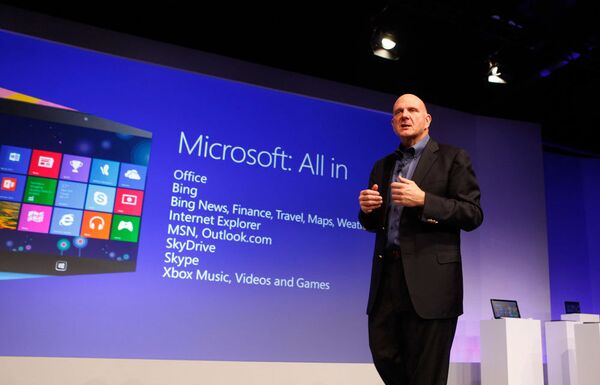Microsoft, the fourth-most valuable company in the world, could be in the midst of a make it or break it moment. The software giant is betting big on Friday’s launch of Windows 8, the most drastic change to its operating system in more than 15 years.
On Friday Microsoft also launched its first tablet, the Surface for Windows RT tablet; three years after Apple first introduced the iPad.
“If we’re not first, we want to be better,” said Microsoft CEO Steve Ballmer in an interview with ABC News.
While some tech analysts say Microsoft is habitually late to the game, others say Windows 8 is a colorful, intuitive revamp that integrates touch screen technology with desktop computing, and they brand the Surface as the first “real challenger” to the iPad.
“What Microsoft is essentially doing is moving touch from the realm of the completely mobile (tablets and phones) to the sometimes mobile (laptops) and the never mobile (desktop all-in-ones),” said Barbara Krasnoff editor for Computer World.
Microsoft is fundamentally re-thinking what the tablet should be, said Mat Honan a tech writer with Wired Magazine.
“Google and Apple are pursuing a strategy where the tablet and the phone are essentially variations of each other,” Honan said. Microsoft has taken a different approach, viewing the tablet as “gateway between mobile and desktop” Honan said.
“Few people create documents, spreadsheets or presentations on their iPads,” said David Goldman, a tech reporter with CNN.
Microsoft is betting big that the Surface will change that.
“We started to look back and we said, wow, the user interface, the experience, the form factors, the kinds of PCs, were all developed in the mid-1990s," said Steven Sinofsky president of the Windows Division in an interview with ABC News. “We looked and we said things are so different, we need to envision a new kind of software for those scenarios because the world is a different place."
It’s no secret Microsoft needs the Surface and Windows 8 to succeed. The marketing campaign alone made history, costing an estimated $1.5 billion dollars. Forbes reports it’s the biggest product launch in the history of the tech industry.
But despite the Herculean ad campaign that included primetime commercials and a New York City interactive exhibit called “Microtropolis”, tech analysts say Microsoft’s launch just didn’t generate the same buzz as rival Apple does when it launches a product.
“As dominant as Microsoft was in the ‘90s, its products were never a status symbol like Apple’s are today,” CNN’s Goldman said.
On the eve of the Windows 8 launch, Microsoft’s CEO and staffers gathered Thursday with bloggers and tech writers in New York City to officially launch both Windows 8 and the Surface, but according to event attendees, the event was lackluster at best.
Melissa Perenson, a tech writer with PC World, described it as, “something more akin to an infomercial.”
“Thursday's event was short on data that could add fresh perspective to the same-old, same-old we've been hearing about Windows 8 since Microsoft showed off the consumer preview in February,” Perenson wrote.
Others left the event feeling like Microsoft had once again laid the foundation of what is yet to come.
Kyle Wagner, a writer for the tech blog Gizmodo, in his assessment of Windows 8 said it felt like a “rough draft of a deeply interesting idea.” Impressive ambition, but not quite there yet, Wagner said.
Reviews of the Surface have been mixed. While critics seem to unanimously admire the look and the design, it’s the software that has been met with complaints, ironic for a company that’s bread and butter lies in software development.
The Surface’s battery life, at 8 to 10 hours is better than Google’s Android tablet but not as reliable as the iPad, which consistently gets 10 hours of battery life reviewers said.
Another gripe is the still evolving Window’s app store. Some reviewers felt consumers would be disappointed by the approximately 100,000 apps in the Windows store. Apple’s app store in comparison has approximately 700,000 applications.
Some say the true test of Microsoft’s success as a comeback in the tech world doesn’t necessarily lie in current sales.
Barbara Krasnoff of Computer World believes the true test will come over the course of the next several years, if Microsoft is able to change user’s expectations, similar to what Apple has done with products like the iPhone and now the iPad.
“If Microsoft actually succeeds in changing users' expectations in what they want from their hardware, will competing companies such as Apple start looking at creating laptops and other larger devices with touch screens as well?” Kransnoff asks.
If this happens, Kransnoff speculates Microsoft and Windows 8 could be responsible for ushering in a new era of touch screen computing.

